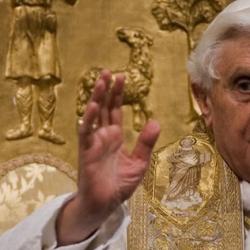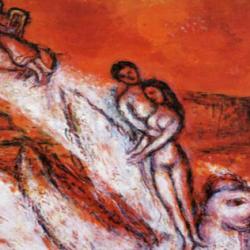In an essay in A Companion to Gottfried of Strassburg’s Tristan, Ulrich Muller argues that “In Tristan und Isolde Wagner radically transformed the meaning and message of Gottfried’s romance, just as he had in Parsifal. As cast by Gottfried (and in all medieval versions), the lovers and their love are censored, repressed, and finally defeated by the structure and rules of the society in which they are living, which is to say feudal society. Wagner’s version on the other hand strives to demonstrate that love per se cannot be fulfilled perfectly within the limits of the world, but only by escaping to the other world, to the mystical night, to nirvana” (288).
Roger Scruton (Death-Devoted Heart) acknowledges the force of that argument, especially insofar as Wagner’s opera was formed by Schopenhauer, for whom eros is death. Night is, for Schopenhauer, a death, a loss of individuality, a “melting away into the ongoing stream that is the will behind appearances” (13).
Similarly, in the opera, “day is a symbol of the public world—the world of others, in which all is open to the gaze, illumined and also compromised. The night, by contrast, is a symbol of intimacy and secrecy. In Wagner’s night there is no other, since self and other are one. The dissolution of the self that occurs in love presages the final dissolution in death—the release from the world of daylight into eternal night, which thereby becomes both the symbol and the goal of love. Expressed in such a stark and prosaic form, those ideas may sound fantastic. But the artistic purpose of Wagner’s drama is to show that they are not fantastic at all, but rather the exaltation and vindication of a tendency that is already there in all of us, buried like a seed in the most mundane human love, unable to bud in the trampled world of daily life but flowering at last in art, which rescues from the marketplace of compromise this ‘most beautiful of my dreams,’ as Wagner described it (51).
But this is not, Scruton thinks, Wagner’s final assessment of erotic love: “erotic love is essentially individualizing: its intentional object is the irreplaceable incarnate subjectivity of the other, as he is in himself, irreducible to his attributes or to any characteristic that he might share. Such indeed is the meaning of the Look shared by Tristan and Isolde, which sets the whole drama in motion. What is valued in erotic love is precisely the other person as an individual, and not the impersonal will behind appearances, which is equally manifest in us all. Erotic love is a defiance of death and death’s dominion, both in its function as the progenitor of future generations and in its intentionality as the celebration and endorsement of the individual subject, when that subject becomes object of another subject’s love. . . . Wagner certainly was influenced by Schopenhauer’s conception of death, of the individual’s inherent tendency toward death, and of the final consolation contained in that melting away into the primeval stream. But he did not believe that the force of erotic love lies elsewhere than in the individual subject, or that it was directed toward anything but the individual object” (130-2).















